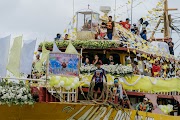There’s a battle of wills in the estuary. It’s where gushing river water meets gurgling sea water, like two cars in counter flow. This clash of logic is not dissimilar to the quandary NGOs often find themselves in in helping calamity-ravaged communities. The latter believes restoring their settlements even in danger zones is compelling. The former thinks moving them to safer, dryer, higher ground is valid. In the end, you will be surprised, the one who aids buckles out of an unconditional yearning to help.
In the unassuming town of Ilog, fisher folk neighbourhoods dot the banks of the Ilog-Hilabangan River, the longest in these parts. Here, a story unfolds that speaks of resilience, community, and steady love. The narrative talks of unbreakable human spirit, which aligns with the core mission of Negrense Volunteers for Change, an organization known for impactful interventions in various challenging circumstances. Since its establishment in 2010, NVC volunteers have dealt with calamities of different kinds, consequently realizing the indispensability of preparedness when it comes to mounting effective responses.
Ilog stands unique within Negros Occidental's tapestry. Founded in 1584, its strategic location with a river running through it facilitated commerce and movement. The river's bounty drew settlers, making the town a natural hub and the province's inaugural capital. As time went by, what grew with age was the profound bond shared by the people of Ilog with the river that sustained their livelihood through generations. The river splits straight through the town's heart, dividing what was once whole to symbolize the duality of its nature, as its power to give life is always balanced by its power to take it away. Though posing a yearly threat during the monsoon season, in times of calm, the river is the primary source of local oysters or “talaba”. Despite the perils of rising tides, the river's abundance far outweighs the risks. The inheritance of living along its banks, passed down through generations, has ingrained it as an inseparable part of the people’s heritage.
The tale of Ilog took an unforeseen turn in 2022. Ravaged by Typhoon Odette, the town's talaba economy suffered a heavy blow. Residences were demolished, livelihoods obliterated, and despondency gripped the community. NVC entered the scene with a resolve to help. Help, how? It might have been prudent to resettle the people away from the banks, but the bounty of the river has sent generations of children to school, put food on the table, and afforded locals an honest living. One’s modern sense does not always stand up to time-honoured traditions. Just as water always finds its level, the fluvial commerce of Ilog found its rightful restoration. NVC brought in start-up materials to restore the talaba beds, including plastic drums, bamboo poles, nylon twines and rope, and floaters made from recycled plastic bottles. As the men looped and laced their oyster seeding devices, the women went about threading palm fronds to restore roofs of their houses.
Talaba shells are strung by nylon twine then attached to bamboo poles before they are submerged in the river for seeding.
At the forefront of this recovery is Rosalie "Rose" Pineda, President of the Barangay Dos Talabahan Owners Association. With over 40 members, the association's journey is one of revival and renewal. Established in 2018, the talaba growers' association encountered setbacks due to the pandemic but emerged stronger year after year. Their shared dependence on the river bound them, fostering a close-knit community committed to each other's well-being. Then Odette slammed across the island.
As recovery from Typhoon Odette began, another tempest, Typhoon Paeng, struck in the same year. Although the damage was partial, it tested the people’s determination all the more, and NVC’s endurance all the same. Through turbulent weather, NVC remained a steadfast anchor, aiding the talaba growers as they persisted. This shared commitment to work together heralded a fresh chapter in 2023 when the community embraced a small-scale “alimango” or crab fattening enterprise, again with the support of NVC. This partnership reflects the embattled fisher folk’s eagerness to learn and adapt, despite clear and present dangers. NVC is just glad to see them through the process, and see them rise above their torments.
Calamity relief and community restoration are unconditional. Acknowledging that relocating victims from the riverbanks would defeat the intention of helping them rebound as quickly as possible, NVC agreed to restore the talaba beds. And then some. The approach stood out, as NVC extended its hand across various societal sectors. Unlike the usual survival kits, though, NVC's intervention makes a felt difference, so people not only get by, but get better.
Written by: Mayumi Espina
Photo by: Unit A Creatives
Video by: Unit A Creatives






 Local talaba growers patrol the river to check on their seed beds.
Local talaba growers patrol the river to check on their seed beds. Rustic technology that works tell of a rich heritage. These are the cages used to catch alimango.
Rustic technology that works tell of a rich heritage. These are the cages used to catch alimango.







